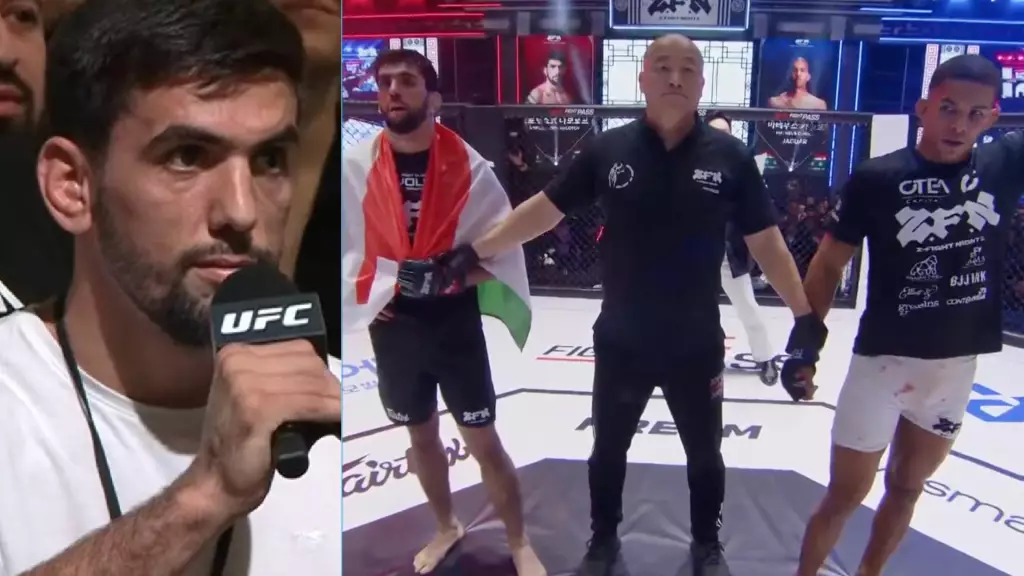The mixed martial arts (MMA) world is known for its unpredictability, and few stories highlight this more perfectly than that of Dorobshokh Nabatov. In a moment that fueled dreams for many, Nabatov boldly requested a UFC contract during a press conference with UFC president Dana White in October 2024. His audacity was celebrated, and he was soon presented with the chance of a lifetime to prove his worth in the octagon during Chan Sung Jung’s Z Fight Night 2, held in Goyang, South Korea. However, what unfolded in the ring showcased the harsh realities of competitive fighting, culminating in a split decision loss against the promising Matheus Camilo.
Nabatov entered the fight with an impressive record of 8-0, yet the glow of an undefeated fighter can sometimes obscure underlying deficiencies. His matchup against Camilo, an athlete recognized for his pedigree at Xtreme Couture, proved to be a litmus test. UFC president Dana White’s subsequent analysis of the fight revealed stark contrasts between the two athletes. While Camilo was lauded as a “better, well-rounded fighter,” Nabatov’s approach seemed limited and predictable—a revelation that raises critical questions about his preparation and adaptability in high-stakes environments.
The anticipation surrounding the bout was palpable, especially given that the victor would secure a coveted UFC contract. However, with Nabatov’s first professional loss weighing heavily on him, it is essential to recognize the implications of this defeat on an athlete’s psyche and future trajectory. Defeats often forge stronger fighters, but this setback illustrates how crucial it is for athletes to exhibit not just talent but also versatility and mental strength under pressure.
Challenges Beyond the Cage
Another layer complicating this narrative is the backdrop of White’s absence at the event—an unexpected twist caused by a state of martial law imposed in South Korea. The UFC’s decision to alter White’s plans underscored the unpredictability that often shadows large-scale competitions. Although White scaled back his physical involvement, he still remained engaged, scouting talent remotely. This shift speaks volumes about the need for adaptability not only within fighters but also in organizational strategies.
Nabatov’s journey also raises questions about the support system surrounding fighters. Reports indicated that during fight week, Nabatov posed significant challenges to the tournament’s operational flow, creating an environment of tension that might have affected his performance. The instance serves as a reminder that mental fortitude, preparation, and personal conduct can be as important as physical training.
Despite the disappointing result, Nabatov’s story is far from over. With a record now standing at 8-1, he has the opportunity to rebound from this defeat, assess and evolve his fighting style, and return stronger. The road to the UFC may seem a little longer now, but every fight is a chance for growth and redemption. For fans and aspiring fighters alike, Nabatov’s journey reflects the multifaceted nature of sports, where tenacity, skill, and adaptability often determine an athlete’s legacy.
In the competitive world of MMA, success is not solely defined by victory or loss but also by the lessons learned along the way. As the dust settles on this pivotal moment, both Nabatov and Camilo emerge from the fight with invaluable experiences that will shape their futures in the unforgiving terrain of mixed martial arts.

